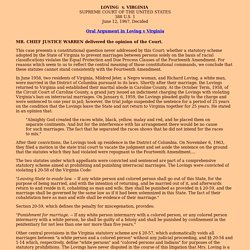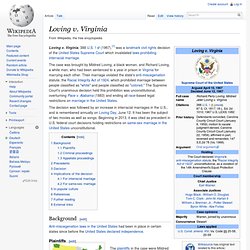

Loving v. Virginia - Oral Argument. Argument of Philip J.

Hirschkop Chief Justice Earl Warren: Number 395, Richard Perry Loving, et al., Appellants, versus Virginia. Mr. Hirschkop. Mr. I'm Bernard S. I would like to move the admission of Mr. He's a member of the Bar of Virginia. Chief Justice Earl Warren: Your motion is granted. Loving v. Virginia. MR.

CHIEF JUSTICE WARREN delivered the opinion of the Court. This case presents a constitutional question never addressed by this Court: whether a statutory scheme adopted by the State of Virginia to prevent marriages between persons solely on the basis of racial classifications violates the Equal Protection and Due Process Clauses of the Fourteenth Amendment. For reasons which seem to us to reflect the central meaning of those constitutional commands, we conclude that these statutes cannot stand consistently with the Fourteenth Amendment.
In June 1958, two residents of Virginia, Mildred Jeter, a Negro woman, and Richard Loving, a white man, were married in the District of Columbia pursuant to its laws. Shortly after their marriage, the Lovings returned to Virginia and established their marital abode in Caroline County. "Almighty God created the races white, black, yellow, malay and red, and he placed them on separate continents. These convictions must be reversed. Loving v. Virginia. Loving v.

Virginia, 388 U.S. 1 (1967),[1] was a landmark civil rights decision of the United States Supreme Court which invalidated laws prohibiting interracial marriage. The decision was followed by an increase in interracial marriages in the U.S., and is remembered annually on Loving Day, June 12. It has been the subject of two movies as well as songs. Beginning in 2013, it was cited as precedent in U.S. federal court decisions holding restrictions on same-sex marriage in the United States unconstitutional. Background[edit] Anti-miscegenation laws in the United States had been in place in certain states since before the United States declared independence.
U.S States, by the date of repeal of anti-miscegenation laws: No laws passed Before 1887 1948 to 1967 12 June 1967 Plaintiffs[edit] Mildred and Richard Loving in 1967 The couple had three children: Donald, Peggy, and Sidney. Criminal proceedings[edit] Appellate proceedings[edit] Precedents[edit]